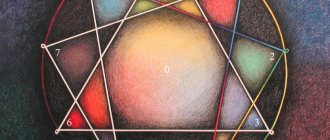With this introductory article we begin our acquaintance with Psychosophy, a typology that divides people into 24 psychotypes. This approach is very interesting and is worth our careful study. I will not describe Psychosophy itself in detail; there is a lot of material on this topic on the Internet, and you can easily figure it out on your own. I will only give the basic concepts, definitions and briefly describe the essence of the method. And of course, those points that relate to our topic of determining your purpose will be discussed in detail
Psychosophy (or psyche-yoga or Afanasyev’s typology) is a typology created by Alexander Afanasyev on the basis of Socionics (which, I hope, we will also get to in due time). Psychosophy studies the sphere of a person’s priorities, his own ideas about his inner world and his capabilities. And this is exactly what we need to determine the purpose
According to Psychosophy, the entire sphere of human existence can be divided into four aspects
Physics (F*)
- Everything related to the material world and material objects
- Attitude to your physical body and its needs
- Physical labor and work in general
- Physical strength of a person, his physical skills and capabilities
- The ability to act in the world of physical objects
- Biological aggressiveness and readiness to resolve conflicts by force
* – here and below the first letter of the aspect is indicated in brackets (F means Physics). This short abbreviation will be needed to compile psychotypes
Logic (L)
- This is everything that is a product of the activity of the human mind, regardless of whether it has a material embodiment or not
- The world of our ideas, fantasies, reflections
- A person’s ability to create something on a subtle level, i.e. in the mind, at the level of ideas and concepts
- Everything related to knowledge, the learning process and the transfer of knowledge
- A person’s ability to analyze, his analytical abilities
- The beauty and completeness of ideas, the value of inferences, conclusions, various types of theory and theoretical models
Will (B)
- Human willpower, perseverance, motivation
- Will is the driving force that motivates a person to act in this world
- This is the core of personality, which allows you to change something both in the outside world and within the person’s personality itself.
- A sense of purpose and meaning of human existence
- The ability to set goals and achieve them, not only independently, but also to encourage (“ignite”) others to do this
The main idea of Psychosophy is that the individual considered separately from birth was given more of some qualities, and less of others. The so-called measured share. And there are no people who have a lot of everything or, on the contrary, a little of everything; there is a certain balance and distribution of these qualities. The creator distributed these strengths and weaknesses among people to create the current diversity and encourage people to interact with each other. After all, if we assume that I am completely self-sufficient, then why do I need other people? If I have everything, why should I ask others for anything? And on the contrary, if the people around them have everything, and they are 100% self-sufficient, then why should they turn to me for help?
For example, someone is talented in art, but has problems with logical thinking. Someone is very handsome and physically strong, but at the same time he can be a completely weak-willed person. Someone has a brilliant mind and super analytical abilities, but at the same time he is physically very weak. And we constantly see this sad picture of imperfections and incompleteness in real life. All these jokes about blondes, military men, scientists, etc. They just show our disappointment when we see one bright area of a person’s personality, expecting that other areas of a person are just as attractive and strong. But alas, no! Beautiful blondes turn out to be stupid. Brilliant scientists turn out to be weaklings and absolutely do not know how to dress beautifully. Sensual actors who evoke a storm of emotions and experiences turn out to be weak-willed and cowardly in real life. And brave military men turn out to be narrow-minded and cannot show creativity and imagination
And all these described types, who have become heroes of jokes, precisely confirm this model of Psychosophy that God has endowed someone with talents in one thing and deprived them in another.
These above four aspects of being (Physics, Logic, Emotions, Will) are arranged into four places of personality strength or functions. And each function has its own qualities: there are strong and weak, dominant or adaptable, effective and processional. For some function a person is very strong, bright and categorical, for some function he is valued by society, there is one that is very painful for him, and there is one that is completely unimportant for him
Below is a brief description of these features. Like the aspects of being, there are also four functions. And to determine a person’s psychotype according to Psychosophy, we need to arrange the above-described aspects according to the functions described below
2E
The Second Emotion can and wants to react freely and variedly to various emotional manifestations of itself and others. It is interesting to track emotions in others and influence them. They are interested in the mood of other people, their emotional states. They pay attention to what emotions they themselves experience. They love communication, bright and varied. When emotions are expressed around. Accept a variety of expressions of emotions without criticism, support emotions, maintain communication. They pick up on the moods of the surrounding world and are impulsive. They are interested in the inner world of other people. Emotions are important, although often people with 2E claim that they are not necessary. They can and do know how to create a mood, and they are especially willing to do this at the request of other people or for other people so that they like it.
With strong and weak ethics:
With strong socionic ethics, 2Es turn out to be very flexible in matters of ethics, they have both the ability and energy to solve complex ethical situations that may be quite interesting to them.
They feel the ethics of the situation, relationships between people, moods. And they may well influence them subtly and qualitatively. With extroversion, these are very sociable people, constantly looking for new acquaintances, contacts, new situations that are pleasant and interesting to them. With introversion, these are very family people who love their relatives and know how to maintain the comfort of family life and mood. Author: Yulia Kolesnichenko
1st function (“Hammer”*)
The main function of a person. He is most confident in it and perceives it as the most valuable. In the area of this function, a person often expresses himself in excess, without noticing the reactions of others. He doesn’t care about the opinions of others, he is sure that everything he does according to the 1st function is done perfectly and correctly.
Options:
- High function
- Dominant
- Effective
- I am OK, You are not OK
* – in parentheses are the names of the functions that Afanasyev himself gave them
This allegorical comparison with the “Hammer” shows that a person categorically breaks through everything in his path with this strong dominant function. He doesn’t care about other people’s opinions in this area, he is sure that he is right. In fact, he may be right or wrong, the important thing is that he has this unshakable confidence in his rightness. He considers himself an expert in these matters, and the rest are fools. This is how the position “I am OK, but you are not OK” is manifested. The function is high, i.e. a person has a lot of strength in this area, and she is focused on results
3L
3L, however, the search for thoughts is much more difficult. Their attention “turns on” when logical discussions and reasoning begin, when the interlocutor’s opinion changes and new ideas come. They become interested and they listen. However, their interest is selective; there are topics that are important to them. There is some feature in the discussion that they may be attracted to, or that they may not like. And it depends on each individual person and on the specific situation. They are pleased to understand, to feel that they are in this logical process, that they can come up with it themselves and understand it themselves. At the same time, there may come a time when 3L runs out of steam and you want to take a break, change the topic, and continue that same logical work a little later. At such moments, a person’s logic seems to “turn off” and he no longer understands what is happening. At the same time, the dominance of the function may not allow one to accept this calmly - the person may begin to doubt his abilities. And, as a result, either a negative attitude towards one’s self-esteem, or a rejection of the idea being discussed (or the work being performed).
3L wants their opinion to be listened to, for a break to be taken, for someone to talk and reason, but not in a very complex and intense way, while 3L adapts. That they explained and gave exactly the necessary 3L information in exactly the right volume. But these very needs are difficult to realize, much less voice. 3Ls can be carried away by different ideas, be interested in books, strive to get a higher education (first, second, third...) (in order to finally form a confident understanding in their head and feel competent, like a 1L), but in essence, not final knowledge is their goal , but the effort itself. They learn to think throughout their lives and uncertainty about competence motivates them. This is how essentially every “troika” in psychosophy works. In one version, a person refuses an idea (a job, a promotion), being unsure and in fear of hearing “you don’t understand!” you're wrong!". In another case, a person becomes excessively immersed in a question, digs, searches, understands, listens to others - and constantly looks for either other people’s mistakes, or that he still misunderstood and undertaught something. And in the development of the troika, firstly, the degree of “process” logically still becomes adequate to the specific situation and corresponds to the tasks of a person (rather in its high functions). Secondly, a person learns to be aware and understand himself and in a timely manner (that is, in such a way that he himself feels comfortable) to complete logical work and move on to the next question.
A well-developed 3L can explain the material well, competently, and in reasonable detail to others, she is interested in it, and is not lazy to repeat the same thing many times. Often, when they study themselves, it is difficult for them to evaluate their knowledge. He seems to be solving a 3L problem, he seems to know everything and understand it inside and out - but he’s not sure. Stops at every step and strives to ask “is this correct?” And with all this uncertainty - if they say “wrong” without explaining the reason - 3L will have resistance, “How come! I'm right! Or maybe not...” and it’s unclear how to check. (and 3L’s task is essentially precisely in its own process, in the development of its own logic).
2nd function (“River”)
A normative function that knows how to correlate its interests in a given area with the interests of the people around it. This is the most moderate and harmonious function. A person in the second function has the strength and desire to share this with others
Options:
- High function
- Adaptable
- Processional
- I am OK, You are OK
The second function is called “River”, because this allegorical description of the 2nd function is most suitable for comparison with a deep river. The flow of such a river is smooth, even, and calm. This river feeds everything that grows on its banks with life-giving moisture. The very sight of the river evokes a peaceful state. The function is high - therefore, a person in this area, as in the case of the 1st function, also has a lot of strength. But unlike the 1st function, a person in his 2nd function is ready to adapt to those around him, to listen to the opinions of others. The second function represents harmony. A person considers himself to be quite good in this area and those around him too (I am OK, You are also OK). A person is ready to share this power with people, and for him the process is more important than the result
Relationships
Psychosophy easily and logically predicts the relationships between types. The relationships are looked at for each function separately, for example, there are two types EFVL and VEFL. In terms of emotions they have relationships according to the scheme 1-2 (the first with the second), in physics - 2-3, in terms of will - 1-3 and in logic 4-4. Based on the meaning, all possible types of connections can be classified into 4 groups:
Additions (1-4, 2-3).
The strengths of one function naturally cover the weaknesses of another. This is the best combination.
Identical (1-1, 2-2, 3-3, 4-4).
They are characterized by good mutual understanding, and for strong functions, also mutual respect. But the addition does not occur.
Pseudoidentical (1-2, 3-4).
There is no good mutual understanding. People seem to be similar, but the goals of some are the means of others, which makes them fundamentally different. This is a source of misunderstanding in some cases, but not a source of conflict.
Conflict (1-3, 2-4).
There is a deep misunderstanding between these functions, which can even result in conflicts. Only because of this combination of functions can underestimation of a person appear, disrespect for him and his actions.
Already based on this description, it is clear that for each type there is a type with the best and worst relationships. For example, for the EFVL type, the best is LVFE, and the worst is VLEF. Although in theory everything is smooth and logical, in life a lot also depends on a person’s upbringing, the ability to hear other people and value trust. It seems to me from my experience that education, the ability to hear, trust are all psychosophy and can be either present or absent in each type.
3rd function (“Ulcer”)
Painful, restless, insecure function. On the one hand, a person feels the need to prove himself in this area or get something in it, but on the other hand, he does not have the strength to fully demonstrate this or achieve this on his own. A person is not confident in his abilities and is afraid of criticism and negative evaluation. This function is good at seeing the shortcomings of others in a given area and readily criticizes them.
Options:
- Low function
- Dominant
- Processional
- I am not OK, you are not OK
An “ulcer” is the most painful area of a person. He is not strong in this function, but he has a very strong need for it, to receive it or to express himself in it. But since the function is low, the person does not have the strength to get it on his own. Therefore, a person needs help in this area from the people around him. This is a person's area of uncertainty. He understands that he himself is weak in this zone, and at the same time he doesn’t have much trust in those around him (I’m not OK and you’re not OK either). And we get such a deeply unhappy beggar, who is ashamed to ask and cannot help but ask, and in addition to this, he is very attached to what he asks, so any refusal or unwanted scenario is very painful for him
What is psychosophy
Psychosophy (or psychoyoga) is a theory of personality proposed by A. Yu. Afanasyev in the book “Syntax of Love”.
In it, the author proposes to divide people into 24 types. Each type has certain characteristics and, according to a certain logic, interacts with other types, society, and has certain habits and predispositions. Thus, having determined one of the 24 types to which a person belongs, you can give recommendations on what to do in life, which people should be avoided and which ones should be trusted, which aspects of oneself should be developed, etc. This theory is little known. And, unfortunately, information in its pure form is difficult to find except for the original book, of course. Many practitioners you meet see psychosophy as a subset of Jung's personality theory (socionics) and therefore mix both theories. Nevertheless, Afanasyev did not mention anything about socionics and Jung in his book, and his theory is positioned as something separate, integral, closed and independent. It is in this form that I will try to present psychosophy here. My goal is to describe the basic principles of psychosophy for people who have not heard anything about it. I will omit complex and optional elements and terms.
4th function (“Trifle”)
This is the least significant function for a person, and therefore it is calm and detached. Often, according to it, a person does not have his own preferences and easily adapts to others’
Options:
- Low function
- Adaptable
- Effective
- I am not OK, you are OK
A “trifle” is a function to which a person does not attach much importance. He understands that he is weak in this area, but, unlike the 3rd function, this does not bother him at all. “Well, I don’t know how to do this, and I don’t really need it.” According to this function, a person prefers to trust the opinion of external experts (I am not OK, You are OK). As a rule, a person chooses ready-made solutions, what others advise him. At the same time, a person is not inclined to improve or change anything in what is offered to him - he accepts it as is. “They said this shirt is very fashionable this season. I'll wear it well! And without any additional bows or fashionable frills.”
Theoretical foundations of psyche yoga
Psychosophy (Psyche-yoga, psycheyoga, Afanasyev’s typology) is a typology created by A.Yu. Afanasyev on the basis of socionics, which he interpreted in his own way. Unlike socionics, which studies the structure of the human psyche, psychosophy studies the sphere of priorities , his own ideas about his inner world and his capabilities.
According to psychosophy, the entire sphere of human existence can be divided into 4 aspects - Physics (matter), Logic (knowledge), Emotion (emotions, premonitions), and Will (goal).
For each aspect, any person can have one of the attitudes of consciousness that characterizes the attitude towards oneself and others in each aspect: acceptance or non-acceptance. Acceptance is indicated by a “+” sign, non-acceptance by a “-“ sign. Thus, the attitudes of consciousness for each aspect of existence can exist in one of four forms:
Me + You - “My opinion is the only correct one, your opinion does not exist. I+ You+ “I reserve the right to think as I see fit, I also take your opinion into account” I- You- “I’m not confident in myself, but your opinion also makes me doubt” Me- You+ “I’m not I understand this and fully accept your opinion.”
Aspects in psychosophy:
Physics:
Physics (matter) is the totality of all objects that exist in the material world, their physical properties and characteristics, and the manipulation of objects.
Depending on the position of physics in the structure of a person’s priorities, he can be classified into one of the conditional groups:
1st Physics. Owner.
In all matters of the material world, the Owner is guided only by his own tastes and needs. For the first physics, the entire material world is divided into “mine” and “not mine.” Everything “mine” is completely under the control of the Owner. He does not know how to adapt to the physical needs of other people. If some thing that the Owner considers “not his” comes into his hands, he may simply not notice it, and as a result, break or spoil it, because It’s as if she doesn’t exist for him and doesn’t represent any value. The owner of the first physics does not like to be responsible for “someone else’s”. The owner handles “his” things (and this includes everything related to the material world - material resources, money, appearance, physical well-being, etc.) carefully and as he sees fit. He cannot be persuaded to change his mind about how to handle “his” material objects. He hardly changes his habits, and does this only according to his own understanding; he can be called a lazy person and a sybarite. All that others can do is to adapt to the habits of the owner, so as not to interfere with him realizing his physical needs.
2nd Physics. Hard worker.
The area of the material world is the area where the Worker can manifest himself. A hard worker is a sober and practical person who stands firmly on his feet. Throughout his life, the Worker improves his skills in various applied fields, hones various technologies, and improves his qualifications. The owner of the second physics is able to help others in their interaction with the material world for their own pleasure. The worker takes pleasure in sorting out all the details, little things that make up life, giving advice, and taking an active part in the material lives of people close to him. At the same time, he does not forget about his own needs, being able to receive physical pleasure and adapt to any conditions, providing both himself and the people around him with physical comfort. However, if the Worker’s advice is ignored, or, even worse, criticized by others, this offends him.
3rd Physics. Touchy.
In matters of the material world, the bearer of third physics feels extreme uncertainty, even if it has no basis. The touch-me-not is by nature very suspicious in matters relating to his health, appearance, and physical sensations. The touch-me-not divides the entire material world into “mine” and “not mine,” but within the boundaries of this division he is constantly unsure of what causes him discomfort. And if in matters of his own physical body they can still be clearly defined, then where the boundaries of his own material resources begin and end is difficult for him to determine. He does not like other people touching himself and his things. The touchy-feely often experiences fear of a lack of material resources (money, things, health, etc.), which can affect his well-being; he may periodically become despondent from “uncertainty about the future,” become a miser, stock up, and save. He needs the active participation of others in his material well-being. To people he trusts, Touchy can complain about health problems, lack of money, and it is enough for him to simply express confidence that everything is in order to stop worrying about this. Touchy sometimes himself wants to become an authority in matters of the physical sphere - he actively masters various crafts, handicrafts, and willingly takes on solving economic issues, but he is very tired of such a burden, although he does not dare admit it. For every action he takes, he waits for approval - whether what he prepared is tasty, whether he arranged everything conveniently, whether his decision is profitable, etc. Touchy tries not to burden people who are inattentive to his material well-being with his problems, and those who stubbornly do not notice his needs, or even act to the detriment of them, are afraid and avoided.
4th Physics. Lazy person.
In matters of the physical sphere, the owner of the fourth physics himself is able to be satisfied with the necessary minimum, which, in turn, depends on the opinion of his environment on these issues. A lazy person can be called a lazy person in the literal sense only in the fact that he is too lazy to determine the level of his own material needs, and even more so he is reluctant to think about this for others. It’s easier for him for those around him to decide for themselves, without his participation, what exactly they need in material terms - the level of comfort they need, security, etc., and he, in turn, is ready to support them and, if possible, help in realizing these needs. He will fulfill their requests and demands, as long as they tell him exactly what needs to be done and how he can help. As for his own material needs, they are determined by people who are authoritative for him, provided that these needs do not conflict with higher-level functions. He does not like discussions on the topic of everyday life, physical health and well-being; these issues, in his opinion, should be defined once and maintained at the proper level without unnecessary talk.
Logics:
Logic (knowledge) is a product of the activity of the human mind: an idea, a concept, knowledge, as well as the very process of operating with abstract ideas and concepts.
According to this aspect, a person belongs to one of the following groups:
1st Logic. Dogmatist.
The peculiarity of the bearer of the first logic is the confidence that he is right. If this is an intelligent person, then such confidence, as a rule, is not born out of nowhere: before forming his own opinion, he first collects information, and only then forms his own. That is why attempts to challenge his opinion allow one to consider the disputants “stupid people” and sincerely wonder how one can not understand obvious things. A dogmatist likes to talk about a topic that interests him and listen to what other smart people have to say in order to form his own opinion during the discussion, and does not like to argue just to prove that he is right. He does not like long arguments, assumptions and other rhetorical devices, the purpose of which is to lead listeners to accept his point of view. He is also not interested in other people’s reasoning, the purpose of which is to prove the fallacy of his own judgments - after all, he is confident in their correctness, so attempts to convince him seem stupid and ridiculous, and if opponents behave too actively, this can irritate him. A dogmatist is distinguished by his ability to formulate precisely and concisely, but he does not like to prove their accuracy and is nervous if they try to force him to do this. If a Dogmatist has to admit that his beliefs are wrong, this can seriously upset him, even to the point of depression and the feeling “that life has failed.”
2nd Logic. Rhetorician.
The owner of the second logic enjoys the process of constructing logical chains and proofs. The rhetorician will be amused by dogmatic, categorical statements, because he understands that anything can be proven, which is what he actually does sometimes, just for fun - first he will prove one thing, and then, based on the same facts, the opposite. That is why he never takes anyone’s logical beliefs for granted. He likes to reason and participate in other people's reasoning, he can willingly get involved in a dispute, just for the sake of argument, in order to have the pleasure of once again playing with evidence, while he can even help his interlocutors who are confused in their own logical chains, since his goal in the dispute is not proof of one's own rightness. The only thing that can seriously hurt him is disdain for his logical abilities and unwillingness to listen to him.
3 Logic. Skeptic.
A skeptic is extremely meticulous about logic and consistency in any conclusions. Moreover, it happens that he does not have time for this analysis, or is not able to evaluate the very result of these conclusions, and it happens that truly valuable and worthwhile information or opinion is rejected by the Skeptic as not worthy of his attention only for the reason that this information was not considered a fairly convincing and coherent logical explanation has been provided. The skeptic himself is aware of this quality of his and therefore involuntarily expects a catch in any reasoning: “Where is the logical trap waiting for him?” A skeptic is very sensitive to criticism of his beliefs and mental abilities; he is extremely reluctant to give up his opinion, even if he latently feels its inconsistency. You can convince a Skeptic only by gradually justifying in detail a different point of view, breaking the persuasion process into several intermediate stages, each time checking whether he understood and accepted everything. Feeling his insecurity, he sometimes refuses to justify anything logically, because... he is afraid of making a mistake in the logical chain. However, more often he still gets involved in an argument, and gets great pleasure from smashing his opponent to smithereens with his logical arguments, however, even despite the victory, he is gnawed by doubts about this, and the Skeptic needs authoritative confirmation of his rightness, preferably with a detailed analysis of its logical calculations.
4th Logic. Schoolboy.
In the sphere of logical beliefs, Shkolyar focuses not on the process of their development, but on the result - the beliefs themselves. Logical calculations are not of interest to him in themselves, but only in application to life. He is not interested in abstract conclusions. Over the course of his life, the bearer of the fourth logic acquires people who are sympathetic to him for some reason, and if they are able to briefly and clearly express their opinion on issues that interest the Shkoljar, then such people become “authorities” for him, to whose opinion the Shkoljar necessarily listens. Having received new information from such a person, the Student first listens to it, agrees with it, and only then comprehends it, evaluates how applicable it is to life according to his superior functions, and if he was not mistaken in choosing the “authority,” then once again he finds confirmation of the correctness expressed thought. A representative of the fourth logic is sometimes too lazy to justify something logically; it is easier to refer the interlocutor to the same “authorities” who, in his opinion, have stated everything quite clearly. Sometimes it becomes inconvenient for him if there are several “authorities”, and they disagree with each other on some logical nuances, which are quite difficult for Shkolyar to distinguish. However, if Shkolyar has taken the trouble to formulate something, then it will be done very clearly and as succinctly as possible.
Emotion:
Emotion (emotion, premonition) is a way of understanding the world without material contact with it. Feelings, emotions, premonitions, personal experiences of the subject.
According to this aspect, a person belongs to one of the following groups:
1st Emotion. Romantic.
The bearer of the first emotion is so absorbed in his own emotions that he is unable to notice the emotions of the people around him. Romance is characterized by violent (sometimes even excessive) reactions to what is happening. He does not evaluate how appropriate the manifestation of certain feelings is, because he believes that any of his reactions is completely natural. Having caught fire with some idea, the Romantic cannot distract himself from it; he needs to completely burn out, bringing his experiences to the peak. According to the Romantic, only he has the right to determine what emotions are appropriate or inappropriate in a given situation, and what other people should experience. If he encounters the opposite, if the environment ignores his emotional state, he may become offended and increase his distance with these people, considering them insensitive and inattentive.
2nd Emotion. Actor.
In his emotions, the Actor is aimed at the environment. His emotions will always be adequate to the facts that caused them. He transforms easily and does not get hung up on his emotions. It may seem that the Actor does not have his own feelings, but this is not the case; the representative of the second emotion is tuned to the correlation of his emotional state with its relevance in the situation, as well as with the emotions of others. Moreover, he helps others cope with their negative emotions, picking them up at the right moment, and smoothly and imperceptibly correcting them for those around him, leveling out the emotional background at his own discretion.
3rd Emotion. Rusk.
A distinctive feature of the representative of the third emotion is the desire to control one’s own and other people’s emotions with the inability to do this. Seabiscuit is extremely defenseless against emotional attack. Finding himself in a situation of emotional pressure, he is capable of completely losing control over himself; whether at this moment he is cold, withdraws into himself, or falls into hysterics, his behavior will not be adequate to the situation. In such a situation, the cracker becomes completely defenseless against ridicule. And although he feels vulnerable, he is absolutely unable to defend himself. Sukhari is not confident in his emotional assessments and experiences, and therefore needs ongoing unobtrusive emotional support, attention to his own feelings, constant unobtrusive convincing of him that everything is fine, that he is good, others like him, he does not seem funny to them, that he is adequate in his emotions.
4th Emotion. Onlooker.
For Gawker, his own emotions matter very little. He is not sure of the “correctness” of his emotions, nor of the very fact of their existence. However, he is attracted to emotional people. An onlooker is capable of being infected by other people's emotions: smiling when everyone around them is smiling, or feeling sad when others are sad. At the same time, he may be annoyed by attempts to “get into his emotional state” and adapt to him; for the Gawker, this may seem insincerity. The bearer of the fourth emotion is completely dependent in his emotional assessments on the opinions of others, especially if these assessments are well combined with his opinion on higher-level functions; over time, he develops ready-made templates for such opinions on issues of human relations, morality, the characteristics of certain works of art, etc. etc., which, however, he can easily change, since in themselves they are not fundamental for him.
Will:
Will (goal) is a certain force (strength of spirit, desire) that sets in motion all other aspects of existence.
According to this aspect, a person belongs to one of the following groups:
1st Will. Tsar.
One of the signs of the bearer of the first will is absolute confidence in the legitimacy of his desires. At the same time, the Tsar clearly distinguishes where his real desire is and where it is a trifle, a trifle. In any matter, the Tsar is guided only by his own desires. The desires of others and their contradiction with his own desires do not interfere with the owner of the first will; he does not consider them as something worthy of attention. Other people's desires are simply a certain set of conditions that need to be taken into account when realizing your own. According to the Tsar, there are no situations that can interfere with the fulfillment of his desires; moreover, the very fact of the presence of any desire indicates that it is feasible.
2 Will. Nobleman.
When realizing his desires, a representative of the second will always takes into account the desires of others. A nobleman is always interested in the desires of those around him and tries to find a reasonable compromise if these desires conflict with his interests. In all his affairs, the Nobleman strives to ensure that, if possible, no one’s rights are infringed, including his own. A nobleman is always ready to give in (within reasonable limits), or discuss the contradiction that has arisen and find a way to reach a compromise. In his opinion, there is a certain limit within which nothing is impossible, and he is clearly aware of the boundaries of the possible. A nobleman never imposes his desires on others, but on the contrary, wants to help others determine their own desires and is committed to dialogue to help them understand themselves.
3 Will. Philistine.
The representative of the third will is poorly aware of his desires. He can fantasize about “what would I like,” but will not take even a step towards fulfilling even one of his desires, and if this is pointed out to him, thereby reproaching him for inconsistency, he may be offended. At the same time, the Philistine is characterized by the feeling that his own desires and his rights are not taken into account by anyone. And since the Philistine does not have a clear definition of what these “rights” are and where their boundaries are, such a contradiction causes him a lot of suffering. When he has the feeling that he has been “disadvantaged” in some way, the Philistine is able to be indignant and “seek justice.” Or he will silently suffer on the sidelines if he is not sure that he has the right to be indignant, or he will delve into himself and convince himself that it was just his imagination. For this reason, the tradesman needs an active dialogue between those around him regarding his own rights and desires. He needs them to demonstrate a constant readiness to coordinate their desires with his desires, and thereby push him to realize these desires, give him confidence that he has the right to this, in this case, he stops being fidgety and “capricious” and It turns out that, in essence, the Philistine is a rather flexible person, capable of making compromises.
4th Will. Serf.
For a representative of the fourth will, his own desires are something unimportant. This is not to say that he doesn’t want anything at all. He may want something, but it’s just more convenient for him that someone else wants the same thing and starts acting. And if such a person is not nearby, then the bearer of the fourth will can delay the realization of his desire for a very long time, moreover, he may never even tell anyone that he wants something. It may seem that the Serf, like a leaf carried by the wind, is led by the desires of others, and to some extent this is so, if his superior functions do not conflict with the desires of others. The main thing is that these desires are expressed clearly, clearly and, preferably, without options or discussions. Very often the Serf is a fatalist; in his opinion, little depends on his own will. He tries to choose people around him who are purposeful in fulfilling their desires, the realization of which he just needs to join.
Source









